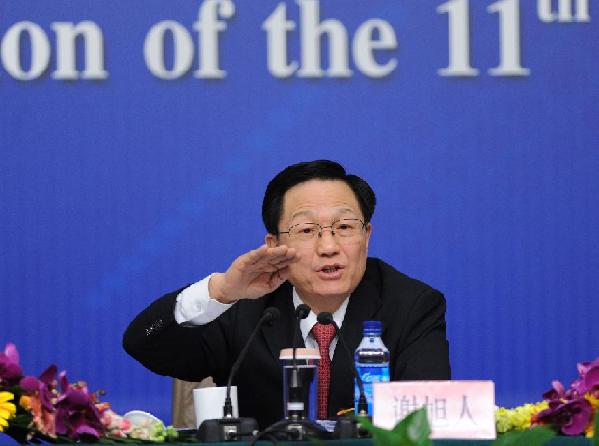 |
| Chinese Finance Minister Xie Xuren speaks during a press conference of the Fifth Session of the 11th National People's Congress (NPC) on fiscal policy and related issues in Beijing, China, March 6, 2012. (Xinhua/Ju Huanzong) |
Chinese Minister of Finance Xie Xuren on Tuesday tried to clear up some public misunderstandings about the country's rapidly expanding fiscal revenue, saying price factors have contributed to these misunderstandings.
Xie's remarks came in an attempt to soothe public discontent over much faster fiscal revenue growth possibly cutting into the people's ability to benefit from the country's rapid economic growth.
"Fiscal revenue has kept growing rapidly over the past few years," Xie said at a press conference. "It was the combined result of a sound and rapidly expanding economy and increasing corporate profits and income."
China's fiscal revenue grew 24.8 percent year-on-year to hit a record-high 10.37 trillion yuan (1.64 trillion U.S. dollars) in 2011, compared with 9.2-percent growth in its gross domestic product (GDP).
The fiscal revenue collected in 2011 also exceeded the government's target of 9.122 trillion yuan for which it had budgeted last year, raising public concerns that the Chinese people may come to bear a tax burden that is too heavy.
Xie attributed the rapid increase in fiscal revenue to the government's moves to bring all extrabudgetary funds under budgetary management, which added about 250 billion yuan to the country's fiscal revenue.
According to the finance minister, China's fiscal revenue -- tax revenue, in particular -- is calculated according to nominal prices, while the GDP calculation is based on prices adjusted for inflation.
"If calculated according to nominal prices, China's GDP in 2011 would have increased by 17.4 percent year-on-year," Xie said. "That would make the fiscal revenue growth very close to the GDP level."
He said China's fiscal revenue consists of 19 tax categories, which are taxed according to their own tax base, rather than taxed directly on GDP figures.
China's fiscal revenue includes value-added tax (VAT), excise tax, customs duties and VAT and excise tax on imports, corporate income tax, individual income tax, VAT and excise tax rebates on exports, and non-tax revenue.
Judging from fiscal revenue collected in 2011, rapid increases were witnessed in taxes related to imports, corporate income tax and VAT, which matched the rapid growth of their tax base, Xie said.
He said that while rising imports will increase the country's fiscal revenue, they will also slow down the GDP, which roughly sums up investment, consumption and exports, minus imports.
The finance minister stressed that the fiscal revenue is collected from the people and will be used for the people.
"An increase in fiscal revenue is helpful for improving people's livelihood, facilitating economic restructuring and promoting the country's development in all fields," Xie said. "It is a very good thing."
However, he warned that such rapid growth might not be sustained in 2012, as suggested by official data from the first two months of the year.
According to Xie, fiscal revenue in the January-February period rose only around 11 percent year-on-year, with the tax revenue slowed to between 8 percent and 9 percent.

